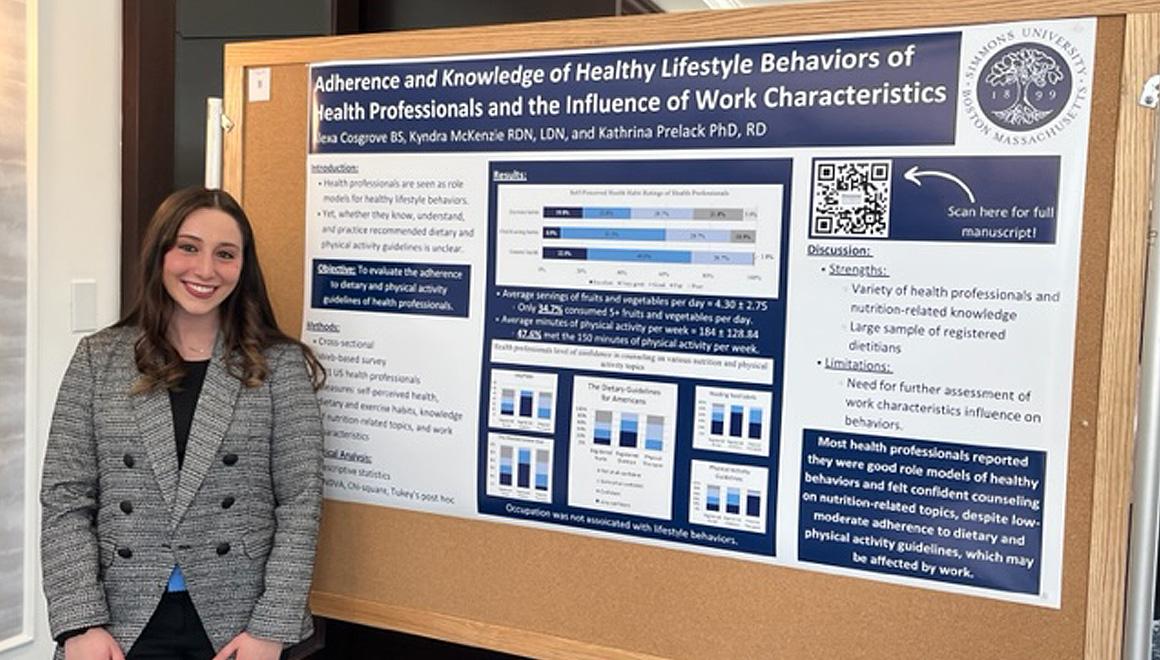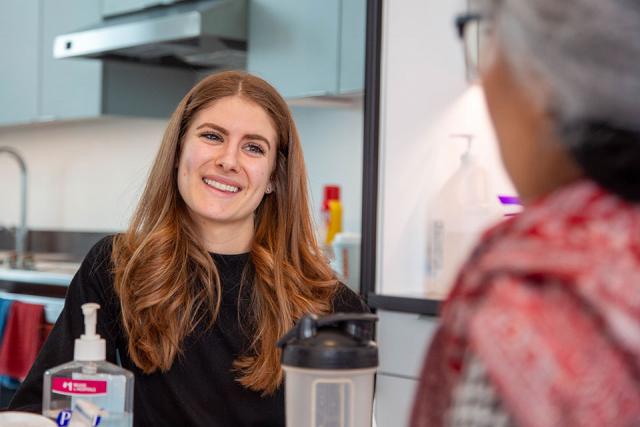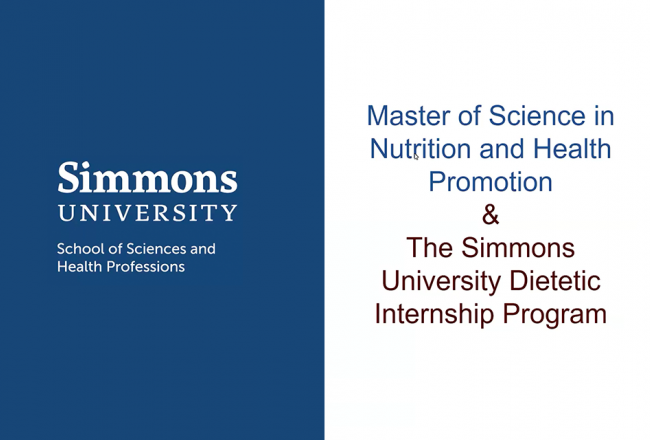Nutrition and Health Promotion

Advance wellness through science and practice
Simmons University's Master of Science in Nutrition and Health Promotion empowers you with an advanced understanding of nutrition, fitness, and wellness. You’ll learn nutrition science and health promotion strategies that prepare you to become a leader in the field of nutrition.
You can choose the format that works best for you: enroll fully online, or attend classes on our Boston campus with state-of-the-art facilities located in the Longwood Medical Area. The neighborhood is home to world-renowned teaching hospitals, including Brigham and Women’s Hospital, Boston Children’s Hospital, Dana-Farber Cancer Institute, and Beth Israel Deaconess Medical Center.
Our faculty members are experts in their fields and committed to providing an education that’s both evidence-based and practical. You’ll join a community of students from diverse academic backgrounds — including nutrition, dietetics, exercise physiology, biology, health sciences, and public health. Upon graduation, you’ll be prepared for careers in research, community nutrition, private practice, and beyond.
If you combine the MS with our Didactic Program in Dietetics (DPD) and a Dietetic Internship (at Simmons or through partner institutions), you’ll meet the requirements to sit for the Registered Dietitian Nutritionist (RDN) registration exam.
Explore the pathway that’s right for you to become an RDN.
Why study nutrition and health promotion?
The World Health Organization defines health promotion as empowering people to take greater control over their health. This approach goes beyond individual behavior change. It addresses the broader social and environmental factors that affect wellness and aims to prevent poor health at its root.
As interest in healthy eating and preventive health grows, so does the demand for qualified professionals focused on human nutrition. By studying nutrition and health promotion, you’ll prepare for a rewarding career in a growing field — and make a lasting, positive impact on the lives of others.
What will you learn as a graduate student in nutrition?
In the program, you’ll explore the science behind food and nutrition, as well as the social and behavioral factors that shape dietary behavior. You’ll learn how to:
- Critically evaluate scientific evidence and apply it to practice.
- Communicate nutrition messages effectively to diverse audiences.
You will customize your plan of study through one of two tracks:
- Applied Nutrition Science Track: Develop research and health communication skills that allow you to interpret nutrition science and apply it in clinical, community, and other practice settings.
- Entrepreneurship Track: Build the skills to launch entrepreneurial ventures in the nutrition field. You’ll take courses from the Simmons School of Management, gain experience in creating innovations for the for-profit, not-for-profit, or government sector, and complete the program by developing a business plan aligned with your career goals.
Flexible program options
You can complete your MS in just one academic year — or over two to three years of part-time study (for US students only). Combining the MS program with Simmons' Didactic Program in Dietetics (DPD) or Dietetic Internship program may take additional time. We offer on-campus classes in the evenings.
If you choose the fully online program, you will take all your courses online. You can still customize your degree through the Applied Nutrition Science or Entrepreneurship track.
I completed my DPD, my master's in nutrition, my dietetic internship, and my certificate in sports nutrition with Simmons. I owe my strengths as a clinician, counselor, and future educator to these programs. – Heather Zeman ’19
Pathways to an MS in Nutrition and Health Promotion
We offer several educational routes to earn your master’s degree:
Standalone master’s program
- For students who already hold a bachelor’s degree.
Please note: Simmons’ BS in Nutrition and Dietetics fulfills the DPD coursework requirement.
Combined programs for students pursuing the Registered Dietitian Nutritionist credential
- MS/DPD Program: Combines the master’s degree with Simmons' Didactic Program in Dietetics (DPD) (both online and on-campus)
- MS/DI Program: Combines the master’s degree with a Dietetic Internship at Simmons and with partner institutions
Accelerated 4+1 programs
- Earn both your undergraduate and master’s degrees in just five years. Open to all majors through the University’s Edge program, provided you meet the prerequisites.
What can you do with a master's degree in nutrition and health promotion?
Our program graduates have pursued a variety of career paths in the field of nutrition and health promotion. They work in public health organizations, hospitals, schools, community-based organizations, private practice, and the food industry.
Simmons graduates seek to improve the health of individuals and communities through roles such as nutritional counseling, program management, and community research.
Highlights of Simmons Nutrition Program
100+ Years
History of Nutrition Education at Simmons
Simmons’ history of nutrition education spans more than a century, highlighted by our department’s many contributions to nutrition science, health, and wellness.
97%
Simmons Dietetic Internship Program RDN Exam Pass Rate
Simmons graduates consistently surpass the national pass rate average on the Registration Exam for Dietitian Nutritionists. The national average is 88%.
Dietetic Internship Webinar
Learn more about the Master of Science in Nutrition and Health Promotion and the Dietetic Internship Program.
Spotlight on Nutrition Students and Alums
Our Faculty
The faculty in the Nutrition Department are nationally known in their area of expertise. Each has years of practice experience in their areas of teaching. They have served in state government boards and national committees, and won national awards.
They are dedicated educators committed to the success of our students. Each student will have a faculty advisor in nutrition who will provide individualized guidance for coursework selection and career planning.



















